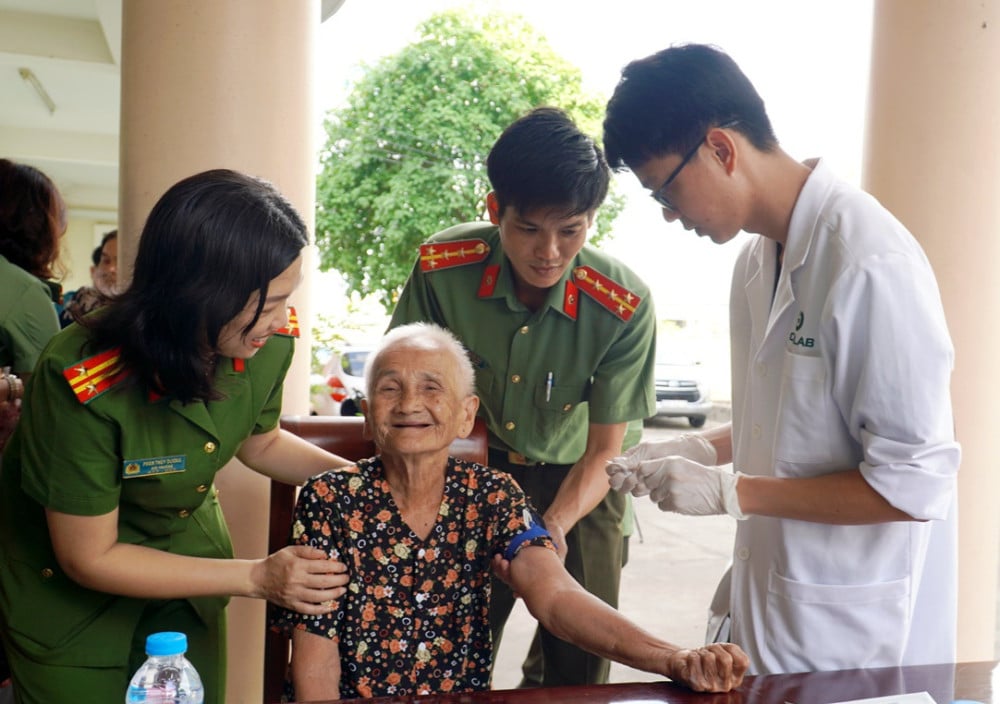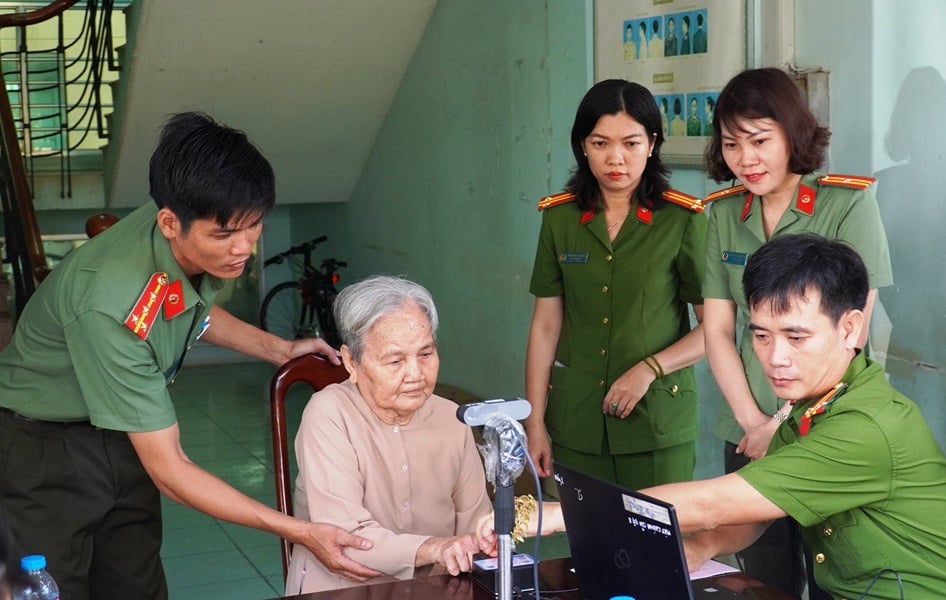Collecting DNA samples from the mother of the fallen soldier.
Opening up new possibilities.
The search for and collection of the remains of fallen soldiers has always been a top priority for the Party and the State. It is not only a political task but also a sacred moral obligation and responsibility. Recently, the Ministry of Public Security has implemented a project to collect and analyze DNA samples from the relatives of fallen soldiers to build a national gene bank, serving as a scientific database for cross-referencing and identifying the remains of fallen soldiers.
DNA sampling is conducted rigorously, scientifically , completely free of charge, and prioritizes samples with high accuracy, especially from the biological mother or maternal relatives of the fallen soldier, as this is a direct bloodline. From here, the journey of "finding names for fallen soldiers" offers much hope.
In Tay Ninh , a land once ravaged by the flames of war, there are currently 33,844 recognized martyrs, but among them, 4,909 remains remain unidentified. Many remains, collected from former battlefields, are buried and respectfully commemorated, but the inscription on their tombstones still reads: "Unknown Martyr."
Through the review and outreach process, 6,699 relatives of fallen soldiers from the maternal lineage have provided DNA samples for identification purposes. However, 4,513 fallen soldiers still lack relatives who have provided DNA samples, making identification difficult.
Lieutenant Colonel Pham Minh Mong, Deputy Head of the Administrative Police Department for Social Order, Provincial Police, shared: “Collecting DNA samples from the relatives of fallen soldiers opens up opportunities to search for and identify the identities of heroic martyrs more accurately and effectively. Each DNA sample is like a piece of the past, a link between the deceased and their living relatives. Taking DNA samples to identify fallen soldiers is also a commitment to history that no one will be forgotten.”
Recently, the Tay Ninh Provincial Police, in coordination with the Department of Administrative Management of Social Order (Ministry of Public Security) and GeneStory Company, conducted DNA sampling for 144 cases of relatives of unidentified fallen soldiers. Of these, 39 cases involved the mothers of fallen soldiers, and 105 cases involved other family members.
What seems like a purely technical task is actually filled with emotion. It's not just about biological samples; it's the last remaining hope of the families of fallen soldiers. All collected samples will be sent to the testing laboratory, compared with data on collected remains, and integrated into the National Gene Bank. Although the process may take a long time, if the results match, it will lead to a belated but incredibly meaningful reunion.
| Behind each collection of biological samples are countless beautiful and heartfelt stories. The members and staff of the task force not only collect DNA samples but also listen to and talk with the mothers and relatives of fallen soldiers to understand and share their feelings. |
"Mom has been waiting for you for so long...!"
A journey to collect DNA samples to identify fallen soldiers offers much hope.
Not long ago, a delegation visited the home of Heroic Vietnamese Mother Truong Thi Chiem (born in 1923, residing in Vinh Hung commune) to collect DNA samples. Her hair was white, her eyes dim, but when she mentioned her son – martyr Tran Van Coi, who died in 1968 – her eyes lit up with hope. More than half a century has passed, and she has never given up hope of finding her son's grave. “The officials came to collect DNA samples, I’m not very familiar with them, but I heard they’re to identify the martyrs. So there’s hope!” she said, her voice full of faith.
In Long An ward, Mrs. Truong Thi Doan, over 90 years old, teared up as she recounted the story of her son, martyr Truong Van Sang, who sacrificed his life in the resistance war against the US to save the country. Looking up at her son's altar, she said, "I'm old now, I don't wish for anything more than to find my son. I've been waiting for him to come home for so long!" The old mother's voice moved many people.
In My Yen commune, Mrs. Tran Thi To Quyen still hasn't given up hope of finding her older brother, the fallen soldier Tran Tan Xuan. "His name is still remembered and called by his family, but we still don't know where his grave is," she said, her eyes reddening.
The search for remains and identification of fallen soldiers is not only a professional task but also a profound expression of gratitude from today's generation to those individuals and families who have contributed to the nation. Behind each collection of biological samples are countless beautiful and heartfelt stories. Members and staff of the task force not only collect DNA samples but also listen to and talk with the mothers and relatives of the fallen soldiers to understand and share their feelings.
The work of collecting DNA samples and conducting identification tests to determine the identities of fallen soldiers will continue in the coming period, hoping to bring about many belated but meaningful reunions. This is a way for those who are still alive to alleviate some of the agonizing question: "Where are my children, my husband, my brother... buried?"
Le Duc
Source: https://baolongan.vn/tim-ten-cho-liet-si-a199727.html





































































![[Hightling] Conference on the Implementation of Tasks for 2026](/_next/image?url=https%3A%2F%2Fvphoto.vietnam.vn%2Fthumb%2F402x226%2Fvietnam%2Fresource%2FIMAGE%2F2026%2F01%2F27%2F1769477856197_dsc01637.jpeg&w=3840&q=75)





































![OCOP during Tet season: [Part 2] Hoa Thanh incense village glows red.](/_next/image?url=https%3A%2F%2Fvphoto.vietnam.vn%2Fthumb%2F402x226%2Fvietnam%2Fresource%2FIMAGE%2F2026%2F01%2F27%2F1769480573807_505139049_683408031333867_2820052735775418136_n-180643_808-092229.jpeg&w=3840&q=75)
![OCOP during Tet season: [Part 1] Ba Den custard apples in their 'golden season'](/_next/image?url=https%3A%2F%2Fvphoto.vietnam.vn%2Fthumb%2F402x226%2Fvietnam%2Fresource%2FIMAGE%2F2026%2F01%2F26%2F1769417540049_03-174213_554-154843.jpeg&w=3840&q=75)







Comment (0)